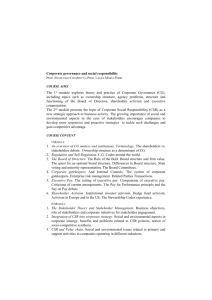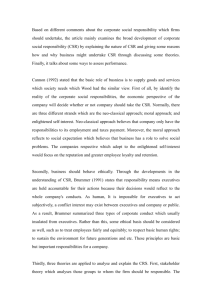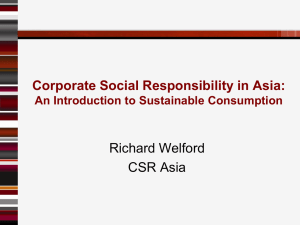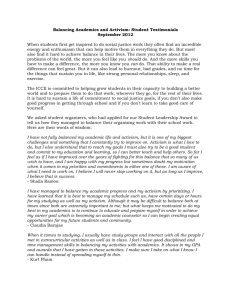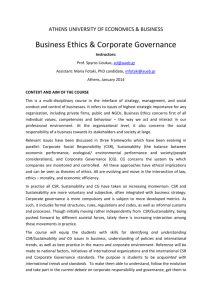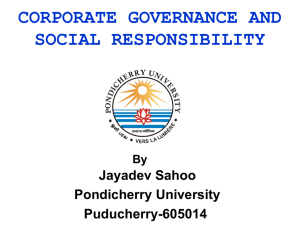Corporate governance and social responsibility
advertisement
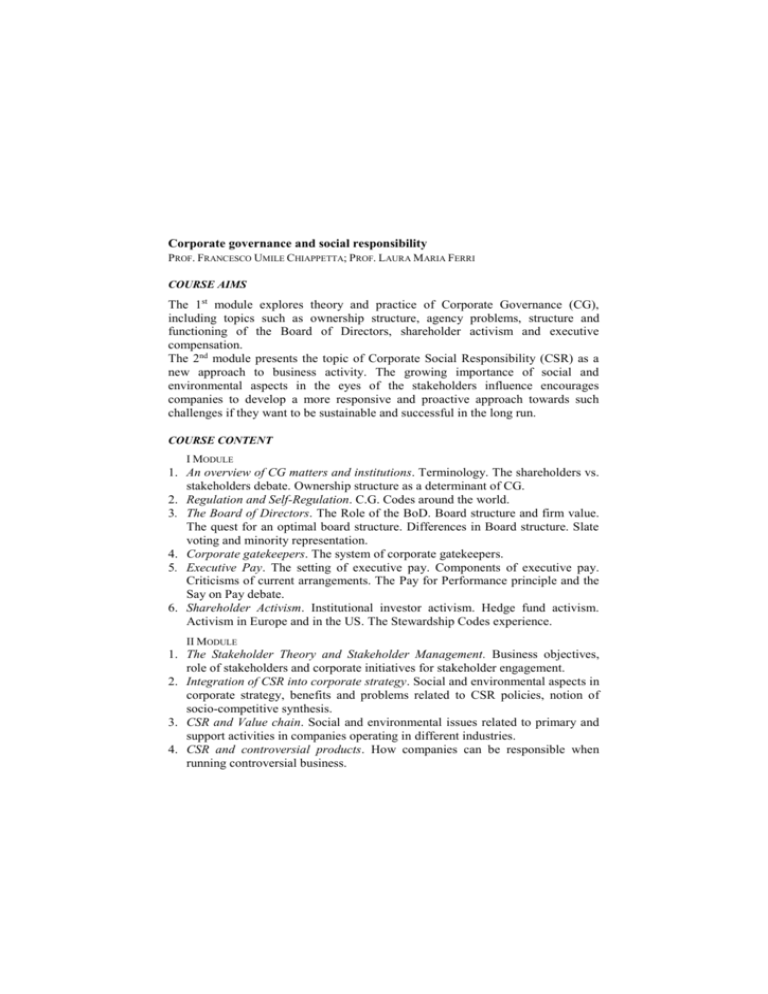
Corporate governance and social responsibility PROF. FRANCESCO UMILE CHIAPPETTA; PROF. LAURA MARIA FERRI COURSE AIMS The 1st module explores theory and practice of Corporate Governance (CG), including topics such as ownership structure, agency problems, structure and functioning of the Board of Directors, shareholder activism and executive compensation. The 2nd module presents the topic of Corporate Social Responsibility (CSR) as a new approach to business activity. The growing importance of social and environmental aspects in the eyes of the stakeholders influence encourages companies to develop a more responsive and proactive approach towards such challenges if they want to be sustainable and successful in the long run. COURSE CONTENT I MODULE 1. An overview of CG matters and institutions. Terminology. The shareholders vs. stakeholders debate. Ownership structure as a determinant of CG. 2. Regulation and Self-Regulation. C.G. Codes around the world. 3. The Board of Directors. The Role of the BoD. Board structure and firm value. The quest for an optimal board structure. Differences in Board structure. Slate voting and minority representation. 4. Corporate gatekeepers. The system of corporate gatekeepers. 5. Executive Pay. The setting of executive pay. Components of executive pay. Criticisms of current arrangements. The Pay for Performance principle and the Say on Pay debate. 6. Shareholder Activism. Institutional investor activism. Hedge fund activism. Activism in Europe and in the US. The Stewardship Codes experience. II MODULE 1. The Stakeholder Theory and Stakeholder Management. Business objectives, role of stakeholders and corporate initiatives for stakeholder engagement. 2. Integration of CSR into corporate strategy. Social and environmental aspects in corporate strategy, benefits and problems related to CSR policies, notion of socio-competitive synthesis. 3. CSR and Value chain. Social and environmental issues related to primary and support activities in companies operating in different industries. 4. CSR and controversial products. How companies can be responsible when running controversial business. READING LIST I MODULE Attending students Articles will be provided at the beginning of the course and uploaded on Blackboard. Non-attending students Readings will be provided at the beginning of the course and uploaded on Blackboard. II MODULE Attending students Articles will be provided at the beginning of the course and uploaded on Blackboard. Non-attending students Chapters from the book: A. CRANE-D. MATTEN-L.J. SPENCE, Corporate Social Responsibility. Readings and cases in a global context, will be listed in Blackboard and professor’s web-page. TEACHING METHOD I MODULE Lectures by the instructor. Active class participation based on the readings is expected. Students are also required to participate to a group project, where they will analyse the corporate governance of a number of companies. Further details will be given in the first class. II MODULE Based on both professor’s lectures and seminars with top corporate managers who will present CSR strategies, policies and practices. ASSESSMENT METHOD I MODULE 60% based on a demanding project work, based on the analysis of a single listed company corporate governance structure; 40% based on a final exam at the end of the module, either oral or written. II MODULE 60% based on a demanding project work, based on the analysis of social/sustainability policies of one company; 40% based on a final exam at the end of the module, either oral or written. FINAL GRADE The final grade will be computed as follows: 50% grade obtained in module 1 examination, 50% grade obtained in module II examination. NOTES I MODULE Although the module is not very quantitative, it is finance oriented: students are expected to read and understand financial statements, and to have sufficient knowledge of the topics which are normally part of a basic course in Corporate Finance (Finanza aziendale I or an equivalent course). A basic knowledge of Corporate Law (in the student’s home country) is also expected. Further information can be found on the lecturer's webpage at http://docenti.unicatt.it/web/searchByName.do?language=ENG or on the Faculty notice board.
